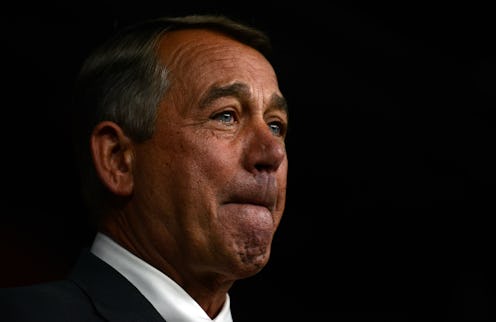News
What Exactly Does The Speaker Of The House Do?
The race is officially on for the next House Speaker. Upon John Boehner's surprise resignation Friday, Republican Congressman Kevin McCarthy has officially declared his candidacy for the position Monday. "I am running to be your Speaker because I know that the people's House works best when the leadership you elect listens to members and respects the legislative process entrusted to committees," he wrote to his Republican colleagues in a letter obtained by The Washington Post. But before we get ahead of ourselves, what exactly does the speaker of the House even do? It's OK — we're all a little bit dusty on Congress proceedings, so here's a throwback to your high school civics class.
Let's begin with current events: Boehner's resignation. After nearly five years as speaker, the Ohio representative was on the rocks with the more conservative faction of the House. Leading up to a major vote on the budget, Tea Party members threatened to oust him if he refused to take a hard-lining position to defund Planned Parenthood. Reluctant to initiate another government shutdown, Boehner announced he'd step down instead. His resignation served as a sharp message to his detractors — whom he called "false prophets" — that ignoring the obligations of the government to its people is irresponsible and should not be tolerated.
Boehner was not the first person in history to resign from his speaker post — he was the sixth. The last Congressman to do so was James Wright in 1989 because of an ethics scandal. Five other speakers have died in office, and none have ever been forcibly removed.
The speaker is the presiding officer over the 435 representatives in the House of Representatives. Voted in by at least 218 members of the House, the speaker not only takes up the administrative duties as head of the House, she or he also assumes the partisan role of leading the majority party, which is currently Republican. Considering the line of succession to the presidency, the speaker is the third most important figure in the American government, standing second in line to take over the Oval Office, after the Vice President.
For each congressional session, the speaker sets the legislative agenda and delegates others to facilitate debates. Speakers rarely vote on legislation or partake in debates on the floor. Their formal duties include swearing in new members and formally inviting world leaders and authorities to address the Congress, as Boehner did so with Benjamin Netanyahu and Pope Francis.
After Boehner steps down at the end of October, it's most likely that he will continue to serve as the representative for his district. As Kevin McCarthy, he's not without opponents. Other contenders include House Majority Whip Steve Scalise of Louisiana, chairman of the House Budget Committee Rep. Tom Price of Georgia, chairman of the House Armed Services Committee Rep. Mac Thornberry of Texas, and chair of the Republican Conference Rep. Cathy McMorris Rodgers of Washington.
